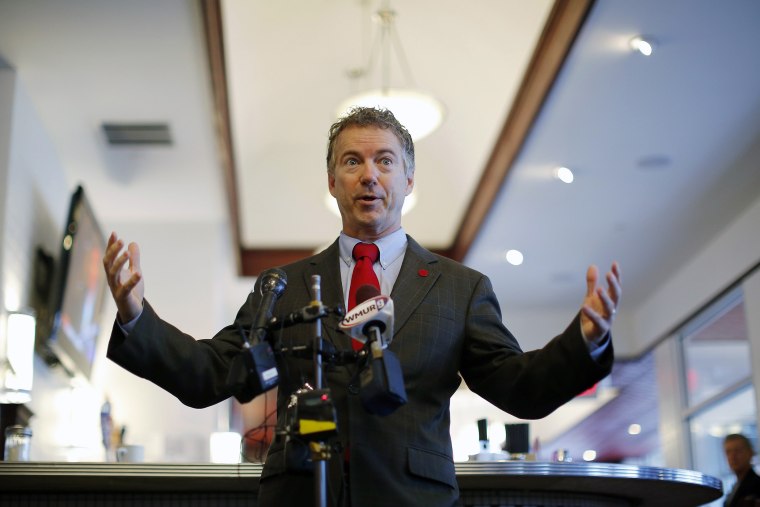Perhaps the luckiest politician in America this week is Gov. Chris Christie (R). The New Jersey Republican inadvertently
touched off a ridiculous conversation about the politics of vaccinations on Monday, and was poised to be at the center of an ugly controversy -- right up until Sen. Rand Paul (R-Ky.) eclipsed him with even more problematic comments.
As of last night, the Republican senator was
still trying to work his way out of the hole he'd dug for himself.
Sen. Rand Paul (R-Ky.) on Wednesday continued to walk back his comments that parents should be allowed to choose whether to vaccinate their children, saying he holds the same position as President Barack Obama on the matter. "I got annoyed that people were trying to depict me as someone who doesn't think vaccines were a good idea," Paul told Fox News host Greta Van Susteren on Wednesday, noting that he had been vaccinated before a recent trip to Guatemala and had vaccinated his children. "I'm not sure I'm different from the president or anyone else on the position," Paul said.
Hmm. President Obama didn't connect vaccines to "profound mental disorders,"
but Rand Paul did. President Obama has never connected vaccines to "martial law,"
but Rand Paul has.
And President Obama was certainly never a member of a deeply strange group called the Association of American Physicians and Surgeons,
but Rand Paul was.
Back in 2009, when Rand Paul was pursuing his long-shot bid to win Kentucky's Republican Senate primary, he spoke to a small physicians' association that has publicized discredited medical theories, including possible links between vaccines and autism and between abortion and an increased risk of breast cancer. At the time, Mr. Paul, an ophthalmologist, was no stranger to the group, the Association of American Physicians and Surgeons. He boasted at its annual meeting that he had been a member for more than two decades and that he relied on its research, statistics and views about the role of government in medicine. "I am not a newcomer to AAPS," Mr. Paul said, referring to the group.
It's a curious thing to boast about. The AAPS has promoted the idea that there's a link between vaccinations and autism (there is no evidence to substantiate the claim). The same group has
also argued that there's a link between abortion and breast cancer (also not true) and that a "'gay male lifestyle" will reduce someone's lifespan by about 20 years (again, not true).
The AAPS, which listed Paul as a member as recently as 2013, has also questioned whether HIV causes AIDS. whether Vincent Foster was secretly murdered, and whether anti-asbestos regulations contributed to the World Trade Center collapse on 9/11.
The
Washington Post noted this morning that Rand Paul "has seemed disinterested -- or unprepared -- for the basic tasks of being a national politician." That's obviously true and it matters a great deal.
For the most part, much of the political establishment has overlooked all of this, instead
declaring him "
interesting," and treating him like a credible figure. But as the senator pursues national office, Paul's most alarming qualities are drawing fresh scrutiny, and as seems clear this week, the journey from "interesting" to "odd" to "nutty" can be brief.
